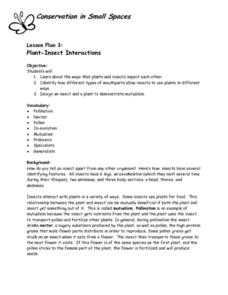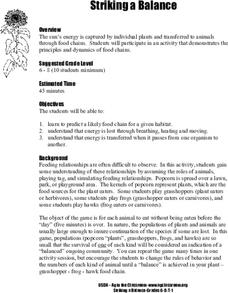Curated OER
Two Beets Or Not Two Beets—What Is Your Question?
Students use the scientific method to test an idea regarding the structures of a plant as it supports the biological evidence for life. In this growing roots lesson, students use organizing sheets to record their findings. Students...
Chicago Botanic Garden
Preparing for Project BudBurst
Male deer growing antlers to begin the breeding season is an example of a phenological event. First in a four-part series is an activity requiring individuals to collect phenological data on their campus. Classes discuss phenology, the...
NOAA
Climate Is Our Friend…Isn’t It?: Make an Extinction Polyhedron
Climate affects populations in different ways. Scholars research extinct organisms and mass extinctions in part three of the 10-installment Discover Your Changing World series. They create graphic organizers, then fill in the information...
Calculated Industries
Army Survival
Intended as a reference tool for US Army personnel, this application can be used in a classroom that is studying historic and current wars or as part of an outdoor education or wilderness survival course. Some of the subjects addressed...
NASA
Exploring the Moon
Can plants grow on the moon? The second instructional activity in a five-part series has pupils explore the resources available on the moon to determine if plant life is possible. They use lava rocks as their soil and draw conclusions...
Curated OER
Life Cycle of Trees
Turn your students into young tree-tectives with this fun science investigation into the life of trees. To begin, a class volunteer gets dressed up in a tree costume as the different parts of trees are introduced. Then, the class learns...
Chicago Botanic Garden
Ecological Mismatches
Modeling is a powerful teaching tool. The final installment in a six-part series has pupils complete an activity to model a food web and discover the interconnected relationships in an ecosystem. They then read about changes in migratory...
Curated OER
Parts of a Plant
Students record observations about parts of plants including leaves, roots, stems, and flowers. They use Kid Pix to draw a picture of a plant and to label the parts of the plant.
Captain Planet Foundation
Which Plant Is Which?
Learn about dichotomous keys, plant identification, and how to care for the planet with a lesson plan that includes several hands-on and innovative activities. Kids go on a plant scavenger hunt and classify the plants that they find...
Curated OER
Plants and Ecosystems
The relationships within and between ecosystems can be explored. after examining an area for living and non-living things students complete the same examination in the forest ecosystem. Students identify abiotic and biotic elements in an...
Curated OER
Plants Definition Activity
In this plants definition worksheet, students choose the correct definition that match a word about plants. A reference web site is given for additional activities.
Curated OER
Plant Cycles
Young scholars identify plants parts and their functions. In this plant cycle lesson, students examine parts of plants and how the parts help them survive in its environment. Young scholars use graphic organizers, the internet, books...
Curated OER
Exploring Texture In the Garden
Students explore the garden environment. In this garden environment lesson, students investigate the needs and parts of a plant. Students discover the differences between fruits and vegetables while creating their own garden.
Curated OER
Plants Blackout Worksheet
In this plants worksheet, learners read the definitions of words related to plants and then write the word on the line. Students write 15 words.
Curated OER
Plants Vocabulary Crossword
In this plants crossword puzzle activity, students use a set of definition clues about plants to complete a 15 word crossword puzzle. A reference web site is given for additional activities.
Curated OER
Plants of the Past
Fourth graders explore ecosystems by examining plants of the past. They discuss ways in which we interact with plants in our daily lives. Students discuss the role plants play in providing food for animals and the significance they had...
Curated OER
Getting a Handle on Your Bee
Students observe dried bees, carefully glue them to toothpicks, and use them for cross pollinating their Brassica plants. They also describe reasons why two similar investigations can produce different results. Finally, students...
Curated OER
Plants Multiple Choice Activity
In this plant instructional activity, students complete a set of 15 multiple choice questions about plants and their growth. A reference web site is given for additional activities.
Curated OER
Ecosystems - Plants and Animals Together
Students study the biotic and abiotic factors of an environment. In this exploratory lesson students examine the different trophic levels and how organisms are connected.
Curated OER
Plants Quick Vocabulary Review Worksheet
In this plants worksheet, students write the plant vocabulary word that is described by the given definition. Students write the words for 15 plant definitions.
Curated OER
Conservation in Small Spaces: Plant-Insect Interactions
Students explore ways that plants and insects impact each other, identify how different types of mouthparts allow insects to use plants in different ways, and design an insect and a plant to demonstrate mutualism.
Curated OER
Sensational Seaweed
Students compare kelp and land plants. In this sea plant lesson, students look at the role of algae in aquatic environments. They research the properties of kelp and explore seaweed.
Curated OER
Striking a Balance
Students explore the many different food chains. They participate in a game in which the class is divided into the different parts of the food chain.
Curated OER
Regents High School Examination: Living Environment 2003
The living environment, from the interior of a cell to the complex relationships among populations, are queried in this final examination. Learners look at air pollution maps, diagrams of cells, population graphs, and drawing of cells....

























